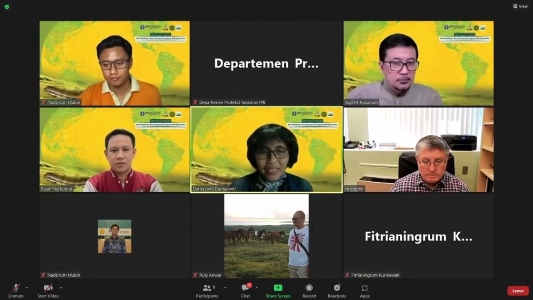Department of Plant Protection IPB University Holds Joint Webinar, Share Insights About the Spread of Armyworms to Students

The Department of Plant Protection, Faculty of Agriculture (Faperta) together with the Center for Transdisciplinary and Sustainable Science (CTSS) IPB University held a Joint Webinar Post Doctoral Program through online Zoom and YouTube. This public lecture aims to share knowledge related to the journey and spread of armyworms, insects native to the tropics from America to Indonesia.
The webinar titled ‘Journey of the Fall Armyworm Across Continents: From America to Indonesia’ presented three speakers. The speakers were Dr Robert L Meagher Jr from the United States Department of Agriculture (USDA) Agricultural Research Service, Dr R Yayi Munara Kusumah from IPB University and Dr Ihsan Nurkomar from Universitas Muhammadiyah Yogyakarta.
The students and webinar participants gained knowledge related to fall armyworm (Spodoptera frugiperda) which is an insect native to tropical areas from the United States to Argentina. Dr Yayi said the larvae can attack more than 80 crop species, including corn, rice, sorghum, barley, sugarcane, vegetables and cotton. Poor handling will result in significant losses.
“Its spread in Indonesia is caused by many factors, mainly climatic factors. The spread of armyworms is influenced by climatic factors such as temperature, humidity and wind direction. It is also influenced by human activities such as trade,” he explained.
Furthermore, he said the distribution route of armyworms can come from West Africa, India, Bangladesh, Myanmar, Thailand and then to Indonesia. Phylogenetic analysis using the COI gene can be used to see the kinship of the armyworm and its further spread.
Dr Robert L Meagher explained the genetic variation of armyworm and its relationship with natural enemies in its natural habitat. Meanwhile, Dr Ihsan Nurkomar shared material related to the latest correlations related to natural enemies of armyworms in Indonesia. (MW/Rz) (IAAS/MKY)



